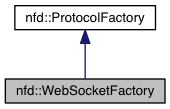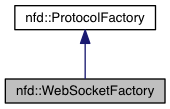#include <websocket-factory.hpp>


Public Member Functions | |
| shared_ptr< WebSocketChannel > | createChannel (const websocket::Endpoint &localEndpoint) |
| Create WebSocket-based channel using websocket::Endpoint. More... | |
| shared_ptr< WebSocketChannel > | createChannel (const std::string &localIp, const std::string &localPort) |
| Create WebSocket-based channel using specified IP address and port number. More... | |
| virtual void | createFace (const FaceUri &uri, ndn::nfd::FacePersistency persistency, bool wantLocalFieldsEnabled, const FaceCreatedCallback &onCreated, const FaceCreationFailedCallback &onFailure) override |
| Try to create Face using the supplied FaceUri. More... | |
| virtual std::vector< shared_ptr< const Channel > > | getChannels () const override |
Definition at line 34 of file websocket-factory.hpp.
| shared_ptr< WebSocketChannel > nfd::WebSocketFactory::createChannel | ( | const websocket::Endpoint & | localEndpoint | ) |
Create WebSocket-based channel using websocket::Endpoint.
websocket::Endpoint is really an alias for boost::asio::ip::tcp::endpoint.
If this method called twice with the same endpoint, only one channel will be created. The second call will just retrieve the existing channel.
Definition at line 33 of file websocket-factory.cpp.
Referenced by createChannel().
| shared_ptr< WebSocketChannel > nfd::WebSocketFactory::createChannel | ( | const std::string & | localIp, |
| const std::string & | localPort | ||
| ) |
Create WebSocket-based channel using specified IP address and port number.
This method is just a helper that converts a string representation of localIp and port to websocket::Endpoint and calls the other createChannel overload.
Definition at line 46 of file websocket-factory.cpp.
References createChannel().
|
overridevirtual |
Try to create Face using the supplied FaceUri.
This method should automatically choose channel, based on supplied FaceUri and create face.
| uri | remote URI of the new face |
| persistency | persistency of the new face |
| wantLocalFieldsEnabled | whether local fields should be enabled on the face |
| onCreated | callback if face creation succeeds If a face with the same remote URI already exists, its persistency and LocalFieldsEnabled setting will not be modified. |
| onFailure | callback if face creation fails |
Implements nfd::ProtocolFactory.
Definition at line 54 of file websocket-factory.cpp.
|
overridevirtual |
Implements nfd::ProtocolFactory.
Definition at line 64 of file websocket-factory.cpp.